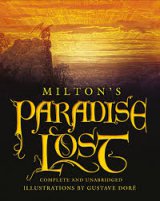Paradise Lost Page #17
Paradise Lost is an epic poem in blank verse by the 17th-century English poet John Milton. The first version, published in 1667, consisted of ten books with over ten thousand lines of verse. A second edition followed in 1674, arranged into twelve books with minor revisions throughout and a note on the versification.
THE END OF THE THIRD BOOK. PARADISE LOST BOOK IV. O For that warning voice, which he who saw Th’ Apocalyps, heard cry in Heaven aloud, Then when the Dragon, put to second rout, Came furious down to be reveng’d on men, Wo to the Inhabitants on Earth! that now, While time was, our first Parents had bin warnd The coming of thir secret foe, and scap’d Haply so scap’d his mortal snare; for now Satan, now first inflam’d with rage, came down, The Tempter ere th’ Accuser of man-kind, To wreck on innocent frail man his loss Of that first Battel, and his flight to Hell: Yet not rejoycing in his speed, though bold, Far off and fearless, nor with cause to boast, Begins his dire attempt, which nigh the birth Now rowling, boiles in his tumultuous brest, And like a devillish Engine back recoiles Upon himself; horror and doubt distract His troubl’d thoughts, and from the bottom stirr The Hell within him, for within him Hell He brings, and round about him, nor from Hell One step no more then from himself can fly By change of place: Now conscience wakes despair That slumberd, wakes the bitter memorie Of what he was, what is, and what must be Worse; of worse deeds worse sufferings must ensue. Sometimes towards Eden which now in his view Lay pleasant, his grievd look he fixes sad, Sometimes towards Heav’n and the full-blazing Sun, Which now sat high in his Meridian Towre: Then much revolving, thus in sighs began. O thou that with surpassing Glory crownd, Look’st from thy sole Dominion like the God Of this new World; at whose sight all the Starrs Hide thir diminisht heads; to thee I call, But with no friendly voice, and add thy name O Sun, to tell thee how I hate thy beams That bring to my remembrance from what state I fell, how glorious once above thy Spheare; Till Pride and worse Ambition threw me down Warring in Heav’n against Heav’ns matchless King: Ah wherefore! he deservd no such return From me, whom he created what I was In that bright eminence, and with his good Upbraided none; nor was his service hard. What could be less then to afford him praise, The easiest recompence, and pay him thanks, How due! yet all his good prov’d ill in me, And wrought but malice; lifted up so high I sdeind subjection, and thought one step higher Would set me highest, and in a moment quit The debt immense of endless gratitude, So burthensome, still paying, still to ow; Forgetful what from him I still receivd, And understood not that a grateful mind By owing owes not, but still pays, at once Indebted and dischargd; what burden then? O had his powerful Destiny ordaind Me some inferiour Angel, I had stood Then happie; no unbounded hope had rais’d Ambition. Yet why not? som other Power As great might have aspir’d, and me though mean Drawn to his part; but other Powers as great Fell not, but stand unshak’n, from within Or from without, to all temptations arm’d. Hadst thou the same free Will and Power to stand? Thou hadst: whom hast thou then or what to accuse, But Heav’ns free Love dealt equally to all? Be then his Love accurst, since love or hate, To me alike, it deals eternal woe. Nay curs’d be thou; since against his thy will Chose freely what it now so justly rues. Me miserable! which way shall I flie Infinite wrauth, and infinite despaire? Which way I flie is Hell; my self am Hell; And in the lowest deep a lower deep Still threatning to devour me opens wide, To which the Hell I suffer seems a Heav’n. O then at last relent: is there no place Left for Repentance, none for Pardon left? None left but by submission; and that word Disdain forbids me, and my dread of shame Among the spirits beneath, whom I seduc’d With other promises and other vaunts Then to submit, boasting I could subdue Th’ Omnipotent. Ay me, they little know How dearly I abide that boast so vaine, Under what torments inwardly I groane; While they adore me on the Throne of Hell, With Diadem and Scepter high advanc’d The lower still I fall, onely Supream In miserie; such joy Ambition findes. But say I could repent and could obtaine By Act of Grace my former state; how soon Would highth recal high thoughts, how soon unsay What feign’d submission swore: ease would recant Vows made in pain, as violent and void. For never can true reconcilement grow Where wounds of deadly hate have peirc’d so deep: Which would but lead me to a worse relapse And heavier fall: so should I purchase deare Short intermission bought with double smart. This knows my punisher; therefore as farr From granting hee, as I from begging peace: All hope excluded thus, behold in stead Of us out-cast, exil’d, his new delight, Mankind created, and for him this World. So farwel Hope, and with Hope farwel Fear, Farwel Remorse: all Good to me is lost; Evil be thou my Good; by thee at least Divided Empire with Heav’ns King I hold By thee, and more then half perhaps will reigne; As Man ere long, and this new World shall know. Thus while he spake, each passion dimm’d his face Thrice chang’d with pale, ire, envie and despair, Which marrd his borrow’d visage, and betraid Him counterfet, if any eye beheld. For heav’nly mindes from such distempers foule Are ever cleer. Whereof hee soon aware, Each perturbation smooth’d with outward calme, Artificer of fraud; and was the first That practisd falshood under saintly shew, Deep malice to conceale, couch’t with revenge: Yet not anough had practisd to deceive Uriel once warnd; whose eye pursu’d him down The way he went, and on th’ Assyrian mount Saw him disfigur’d, more then could befall Spirit of happie sort: his gestures fierce He markd and mad demeanour, then alone, As he suppos’d, all unobserv’d, unseen. So on he fares, and to the border comes Of Eden, where delicious Paradise, Now nearer, Crowns with her enclosure green, As with a rural mound the champain head Of a steep wilderness, whose hairie sides With thicket overgrown, grottesque and wilde, Access deni’d; and over head up grew Insuperable highth of loftiest shade, Cedar, and Pine, and Firr, and branching Palm, A Silvan Scene, and as the ranks ascend Shade above shade, a woodie Theatre Of stateliest view. Yet higher then thir tops The verdurous wall of Paradise up sprung: Which to our general Sire gave prospect large Into his neather Empire neighbouring round. And higher then that Wall a circling row Of goodliest Trees loaden with fairest Fruit, Blossoms and Fruits at once of golden hue Appeerd, with gay enameld colours mixt: On which the Sun more glad impress’d his beams Then in fair Evening Cloud, or humid Bow, When God hath showrd the earth; so lovely seemd That Lantskip: And of pure now purer aire Meets his approach, and to the heart inspires Vernal delight and joy, able to drive All sadness but despair: now gentle gales Fanning thir odoriferous wings dispense Native perfumes, and whisper whence they stole Those balmie spoiles. As when to them who saile Beyond the Cape of Hope, and now are past Mozambic, off at Sea North-East windes blow Sabean Odours from the spicie shoare Of Arabie the blest, with such delay Well pleas’d they slack thir course, and many a League Cheard with the grateful smell old Ocean smiles. So entertaind those odorous sweets the Fiend Who came thir bane, though with them better pleas’d Then Asmodeus with the fishie fume, That drove him, though enamourd, from the Spouse Of Tobits Son, and with a vengeance sent From Media post to Aegypt, there fast bound.
Translation
Translate and read this book in other languages:
Select another language:
- - Select -
- 简体中文 (Chinese - Simplified)
- 繁體中文 (Chinese - Traditional)
- Español (Spanish)
- Esperanto (Esperanto)
- 日本語 (Japanese)
- Português (Portuguese)
- Deutsch (German)
- العربية (Arabic)
- Français (French)
- Русский (Russian)
- ಕನ್ನಡ (Kannada)
- 한국어 (Korean)
- עברית (Hebrew)
- Gaeilge (Irish)
- Українська (Ukrainian)
- اردو (Urdu)
- Magyar (Hungarian)
- मानक हिन्दी (Hindi)
- Indonesia (Indonesian)
- Italiano (Italian)
- தமிழ் (Tamil)
- Türkçe (Turkish)
- తెలుగు (Telugu)
- ภาษาไทย (Thai)
- Tiếng Việt (Vietnamese)
- Čeština (Czech)
- Polski (Polish)
- Bahasa Indonesia (Indonesian)
- Românește (Romanian)
- Nederlands (Dutch)
- Ελληνικά (Greek)
- Latinum (Latin)
- Svenska (Swedish)
- Dansk (Danish)
- Suomi (Finnish)
- فارسی (Persian)
- ייִדיש (Yiddish)
- հայերեն (Armenian)
- Norsk (Norwegian)
- English (English)
Citation
Use the citation below to add this book to your bibliography:
Style:MLAChicagoAPA
"Paradise Lost Books." Literature.com. STANDS4 LLC, 2024. Web. 23 Nov. 2024. <https://www.literature.com/book/paradise_lost_101>.




Discuss this Paradise Lost book with the community:
Report Comment
We're doing our best to make sure our content is useful, accurate and safe.
If by any chance you spot an inappropriate comment while navigating through our website please use this form to let us know, and we'll take care of it shortly.
Attachment
You need to be logged in to favorite.
Log In